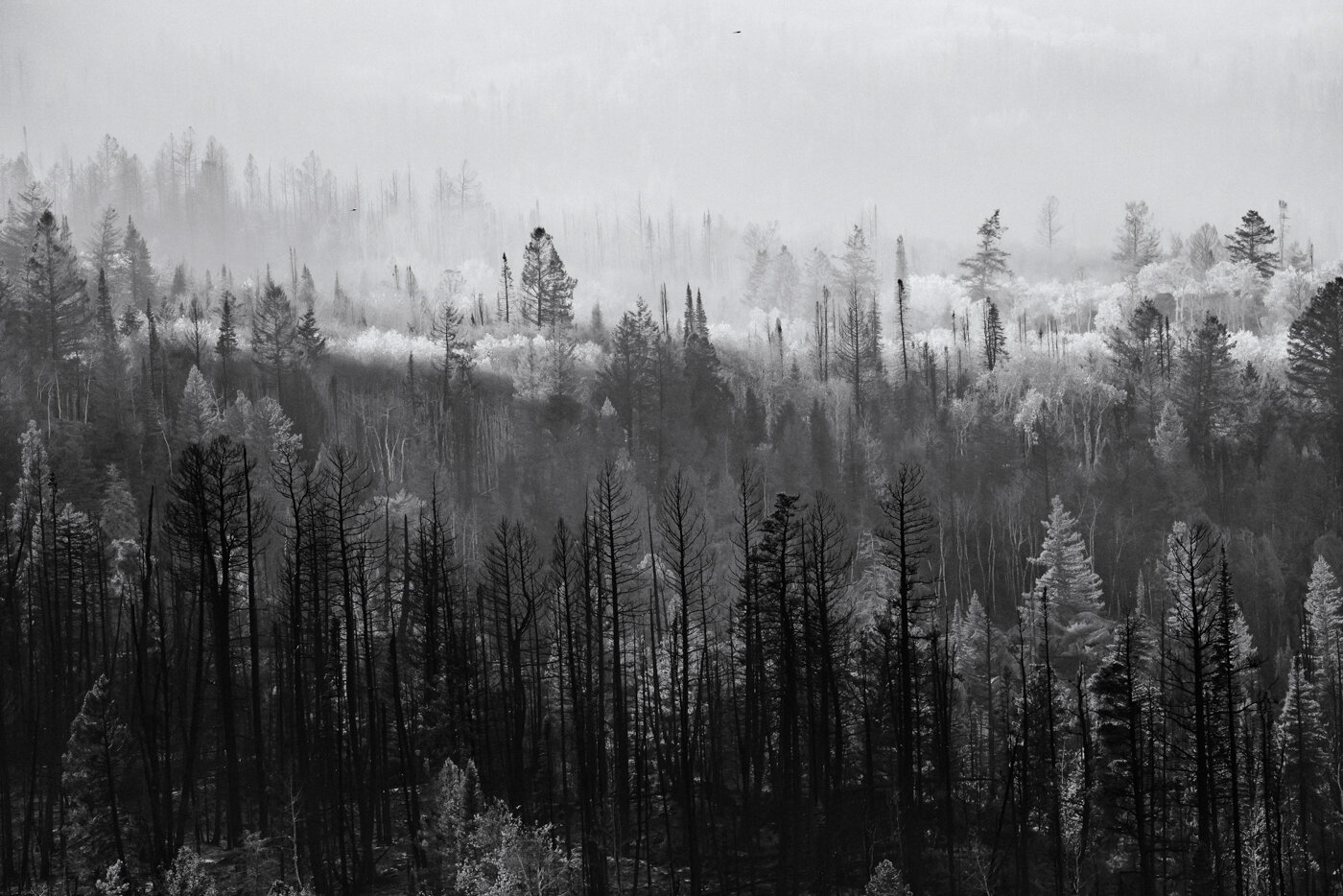BIOPHILIA
As the general way of life got postponed due to Covid-19 lockdowns, people found refuge in wilderness, swarming mountain landscapes as never seen before. In order to understand the human craving for nature, I turned to myself. I merge the photographs of my body with scenes of wild, untouched places. By doing so, I conceptualize my inner landscapes; the yearning for nature created by millennia of evolution.
In the solitude of isolation, I seek the woods. As I walk the trails feeling the grass and rocks under my feet, I find bonds to the environment that surrounds me, but also anxiety and fear of destruction. The health of human species depends on the health of their natural habitats. The biophilia hypothesis argues that our affinity for the natural world is innate, a bond that traces back to times when we lived in closer contact with nature. Can this sudden change with the pandemic shift our species’ narrow self interests to a broader desire to protect our fragile ecosystems and diversity of life forms?
While documenting my time in isolation, I find myself using all my senses to experience the world around me. I smell the fire burning deep under the snow, I feel the rain touching my skin, I observe. Where do we belong? How do we relate?
“Nature has ceased to be what it always had been—what people needed protection from. Now nature—tamed, endangered, mortal—needs to be protected from people.”
- Susan Sontag, On Photography
Stay-at-home order was implemented in the state of Colorado on March 16th, 2020, as a response to the Covid-19 pandemic. As we were urged not to travel more than 10 miles away from home, many found refuge in the mountains that surround us. Each in our own isolation, we kept skiing, climbing, running; breathing in the fresh mountain air, as it is what keeps us healthy around here anyways. Once the stay-at-home order was lifted, all the city folks swarmed our mountains as well, with the tourism numbers higher than Aspen had even seen before. The parking lots became overfilled, people littered everywhere including the mountains as well as roads, and just showed blatant disrespect for the natural world. In order to understand this sudden craving for nature caused by the lockdowns, but also the lack of respect for natural resources, I turned to myself and questioned what a relationship with nature means to me.
In 1984, Edward O. Wilson proposed a hypothesis that human relationship with nature is genetic, owing its roots to millenia of evolution when humans lived in close contact with nature.
By overlaying abstract, close-up photographs of my body onto unscalable photographs of nature, my intention is to show that we as humankind are a part of the Earth, the same way those mountains or rivers are.
Studies have shown that simply spending time in nature is beneficial for human health, and prolonged contact with nature can help reduce depression and anxiety. Yet, human disconnect with nature has been growing in the increasingly technological world. A United Nations report from 2015 showed that 4 in 5 Americans live in urban areas, where their contact with nature is rather limited. This loss of desire to interact with the outdoors has been cited as a potential factor contributing to environmental destruction. As people do not feel like they are a part of a larger ecosystem, they are less inclined to protect the environment and other species from extinction.
To bring it back to the pandemic, even though the last couple of decades have seen a substantial decline in park visitation, camping, and children’s outdoor activities, National Geographic has reported that this year saw a tremendous rebound in Americans participating in the outdoors. Did the lockdowns dig that unconscious deeper connection that we all carry inside us, and only once we were not allowed to be outside anymore, we realized that was all we wanted?
By turning my camera to my own body I found what philosopher and psychoanalyst Erich Fromm describes as “the passionate love of life and all that is alive”. I found solastalgia, as I watched the wildfires burn around the state. I did not grow up in Colorado, and mountains haven’t always been my home. But by immersing myself more in nature, I learned that advocating for conservation of these places that are crucial for our health is the least I can do to fight my eco-anxiety. As reestablishing the human connection with nature has become an important theme in conservation, this is my interpretation of what that connection looks like.
Photographer Simon Norfolk once said that in order to protect a place, we need to be in love with it. Hopefully, this sudden urge to get back in nature makes us more appreciative of what we have, and what we are actively destroying. As society becomes further estranged from nature, we will suffer serious consequences to our mental and physical health. This summer, urban-dwellers reconnected with the natural world, and rediscovered the satisfaction that interaction with nature brings. My intention is to inspire viewers to look deeper inside their own internal landscapes. Maybe along with finding this intuition that reminds us where we came from, they also find the respect for nature that has long been lost.


































